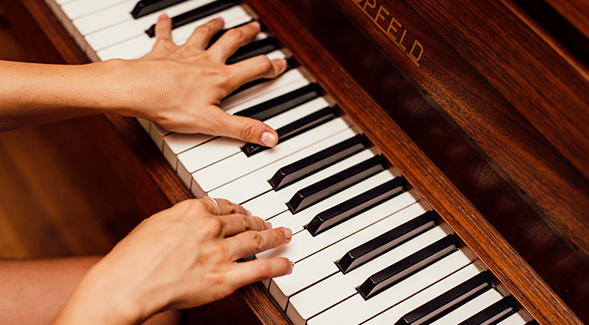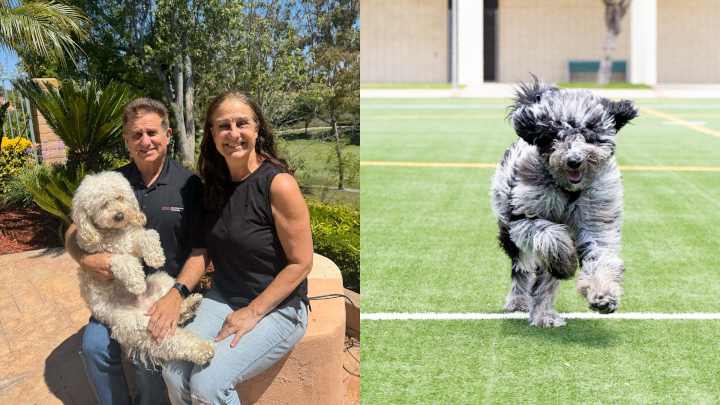Faculty Honored for Dedication to Student Support During Virtual Instruction
The Faculty Forward Awards honor faculty instructors who demonstrated exceptional agility and dedication in transitioning their courses to virtual for fall 2020.

Creative approaches to teaching piano, studying animal behavior and completing hands-on chemistry lab assignments from a distance are among the innovative ways San Diego State University faculty are sustaining instruction and research during the pandemic.
To celebrate the extraordinary dedication, collaboration and innovation of faculty offering courses virtually in fall 2020, Faculty Advancement and Student Success and the Center for Teaching and Learning are honoring 12 faculty members with Faculty Forward Awards for their agility and dedication to student support during COVID-19 pandemic.
“Our faculty have shown great effort in adapting their instruction to meet the needs of students during this time,” said Joanna Brooks, Associate Vice President for Faculty Advancement and Student Success. “The Faculty Forward Awards celebrate those efforts and the outstanding examples of innovative solutions for virtual teaching.”
Nominations were made by colleagues and reviewed by a committee led by Center for Teaching and Learning Director Sarah Elkind and composed of Spring 2020 Faculty Forward Award winners.
“The dedicated faculty at SDSU have shown tremendous resolve and an unwavering devotion to students,” said SDSU Provost and Senior Vice President Salvador Hector Ochoa. “Through the university’s strategic plan, we recognize students are the core of our institution, and we are committed to helping students succeed through transformative experiences in and outside of the classroom.”
The following SDSU faculty were awarded Faculty Forward Awards for fall 2020:
Erin Riley College of Arts and Letters Anthropology professor Erin Riley ensured the pandemic did not prevent her general education students from conducting their own research. For an exercise in applying scientific methods to analyze the natural world, she replaced what formerly were behavioral observations at the San Diego Zoo with a similar research project using zoo webcams from around the world. Riley has also expanded students' primate behavior observation options to include direct observation of human behavior in her students' own homes or in safe, outdoor spaces.
Sonya Schumann College of Professional Studies and Fine Arts Sonya Schumann, a lecturer in piano, found creative solutions to teaching physical and cognitive skills in the virtual classroom by redesigning her course to be especially student-centered, and by going to extraordinary lengths to get keyboards and other musical equipment into her students' hands. This required redesigning the curriculum to accommodate differences in equipment, and to provide students with real-time, one-on-one critique and feedback. She adopted new technologies, using multiple cameras and computers to show keyboard technique and musical scores simultaneously. This has helped her continue teaching music, while overcoming some of the equity gaps inherent in virtual instruction.
Kim Twist and Stephen Goggin College of Arts and Letters In the political science department, assistant professor Kim Twist and and lecturer Stephen Goggin both teach a required statistics course. To build students' confidence in a challenging course, they introduced ungraded assessments of student learning, recorded lectures together and used synchronous class time for review sessions available to students in both sections. This exposed students to two explanations and class sessions of the concepts. Their collaboration shows the advantages of teamwork to create support systems for both faculty and students.
Heidi Keller-Lapp College of Arts and Letters Lecturer Heidi Keller-Lapp in the history department created a low-risk environment for students to practice writing and analytical skills in her virtual classrooms. Keller-Lapp developed a virtual classroom as an active learning laboratory, using Hypothesis (an external tool available through the Canvas learning management system). Her students annotated required readings and commented upon each others' annotations. Her Hypothesis assignments allow students to develop critical thinking in a supportive, engaging community.
Theresa Carlson College of Sciences Adapting large enrollment, introductory lab classes presented special challenges this fall to make lab spaces safe, provide adequate time and instruction for students to complete hands-on labs, and allow alternative assignments when the pandemic required the university to suspend face-to-face instruction. Lecturer Theresa Carlson in the chemistry and biochemistry department met these challenges by redesigning lab projects and creating online lab instruction and support materials for the 450-student Chemistry 200 and 202 lab courses so that students could make the best possible use of limited hands-on laboratory time.
Marissa Vasquez and Frank Harris III College of Education Assistant Professor Marissa Vasquez and Professor Frank Harris III in the Department of Administration, Rehabilitation and Postsecondary Education worked together to develop a single comprehensive assignment to assess student learning in their two doctoral courses. Students were asked to design a campus approach to address the equity issue of their choosing, and present this approach in a one-hour, publicly accessible training webinar for education leaders. This ambitious project is a powerful and scalable example of public scholarship.
Baris Aksanli College of Engineering Aksanli, assistant professor of electrical and computer engineering, replaced a semester-long project with smaller, hands-on programming assignments, each of which reinforced important programming concepts. He further supported student success by scheduling live programming sessions to demonstrate coding utilities in real-time trials, while students submitted comments and questions through Zoom chat. After each session, he posted recordings for students to review while working on their own assignments. This multipronged support was effective at reinforcing their programming skills.
Denise Lebsack College of Health and Human Services Lebsack, an associate professor, built community amongst her Athletic Training Education Program students first by asking each student to submit a short video about themselves, and then creating an online quiz that asked students to match names and "fun facts" about their colleagues. She added telemedicine for concussion management and other new course topics to her curriculum, and also found new community partners who could offer her students the in-person or remote clinical experiences central to their athletic training education.
Linda Copp College of Health and Human Services Lecturer Linda Copp made her food science classes inclusive and participatory by developing assignments and activities her students could complete in their own kitchens, with or without the help of family members and roommates. For greater flexibility, she also redesigned her course into self-paced packets supplemented by weekly drop-in and one-on-one Zoom meetings to provide assistance and answer questions. They also benefited from the continued opportunities for hands-on learning that Copp made available by using household materials for her assignments.
Mei Zhong College of Professional Studies and Fine Arts Mei Zhong, an associate professor, developed a cross-cultural research project for International Studies students who could not travel during the pandemic. They interviewed other international students and led discussions with them on various aspects of American culture. In this way, the two groups of students served as cultural informants for each other, and provided some of the interpersonal, cross-cultural experiences otherwise unavailable during the pandemic.



